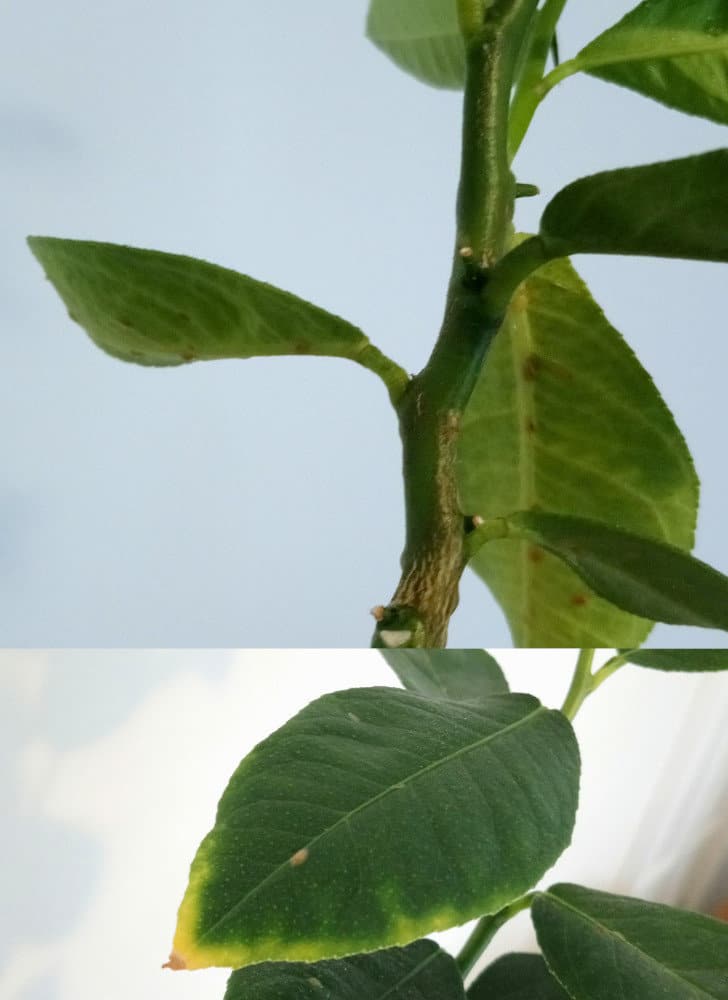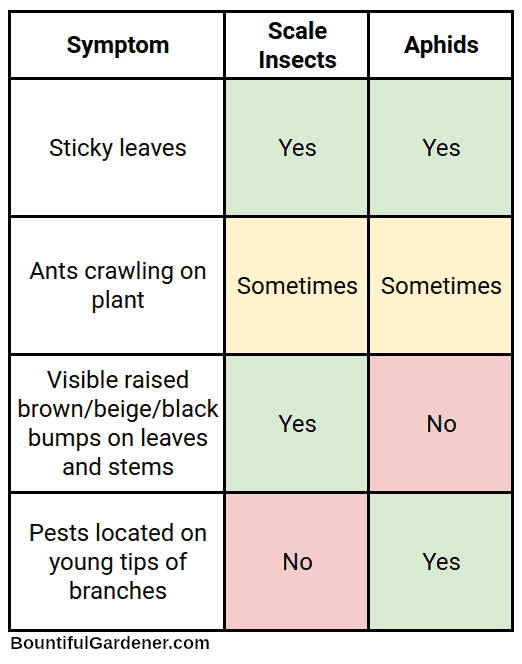Sticky leaves on citrus trees is often the sign of some kind of insect infestation, either on the tree itself, or a neighboring plant which is depositing sticky honeydew.
Aphids can cause sticky citrus leaves, but if you don’t see any insects on your plants, it’s very likely you have scale insects and don’t realize it. Mature female scale insects cover themselves in a protective wax and remain immobile, resembling bumps on leaves and branches.
On this page:
What Is The Sticky Sap on My Citrus?
The sticky ‘sap’ on your citrus leaves is likely honeydew, made by sap-feeding pests like aphids and scale insects. As they suck the sap out of your plant, they digest it and excrete it. It’s still quite sugary (which is why ants love it) which is why it’s so sticky.
Is Honeydew Harmful to Plants?
Honeydew itself is not directly harmful to plants, but can attract ants, which may protect harmful scale or aphids. It can, however, cause sooty mold, which makes the leaves look like they are covered in black soot. Sooty mold doesn’t directly infect the leaves, but can be unsightly and block sunlight.
Also note that severe infestations of aphids or scale can create honeydew deposits underneath and around your citrus trees, affecting other plants next to them, and can be difficult to remove from some surfaces (such as pots).

What Are Scale Insects?
Scale insects are small insects that feed on a variety of plants. Mature females are sedentary and cover themselves with a protective wax coating, making them look like scaly spots on the stems and leaves of your plants. The males look like tiny flies.
Like aphids, they suck the sap out of your citrus plants, and as they feed they excrete honeydew, which ends up making your plant (and sometimes neighboring plants) sticky. Also like aphids, you may find ants crawling on outdoor citrus trees infested with scale, as the ants harvest the honeydew.
Because (female) scale insects can’t move, it can be difficult to know you have them until it’s too late. They can especially harm younger, more vulnerable citrus plants.
Signs of Scale on Citrus
- Sticky leaves
- Raised beige, brown, or black bumps on leaves and stems which can be easily wiped off
- Ants crawling on your citrus trees (may or may not be present)
Check the tops and undersides of leaves, and along branches for scale insects, which look like immobile, raised bumps. Scale on leaves are usually easier to identify as they are often beige, brown, or black.
You may also see ants crawling all over your citrus trees, as ants use honeydew (the sticky sap) as a food source.
How Do You Get Rid of Scale Insects on Citrus?
Spraying horticultural oil or neem oil is the recommended best practice for managing citrus scale infestations. Horticultural oils work by suffocating scale insects. Be sure to apply over the entire citrus tree, including the branches and undersides of the leaves.
The waxy coating over scale insects protects them from chemical pesticides, so it is not recommended to apply them as they can only control the immature crawling nymphs or mobile males.
For minor infestations, or scale on small citrus trees, you can manually wipe them off the leaves and stems and repeat as necessary to thin out their numbers.
Aphids on Citrus
While scale is the most likely culprit behind your sticky citrus leaves, aphids can also cause similar damage to citrus, especially on younger trees or ones that are going through a lot of new leaf growth.
Minor infestations on mature trees usually resolve themselves as the new growth hardens off or if aphid predators are present, but can be treated by spraying affected branches with soapy water and rinsing them off with a hose. Severe infestations may require applications of horticultural oil or neem oil, both of which are organic pest control measures.
Signs of Aphids on Citrus
- Sticky leaves
- Misshapen, inward-curling leaves
- Clusters of aphids on new leaves and shoots
- Ants crawling on your citrus trees (may or may not be present)
Mature leaves and branches are too tough for aphids to chew through, which is why aphids are mainly seen on young trees or the new shoots of mature trees. You will find them congregating right on the tips of those shoots or young leaves.
Large enough numbers of aphids can damage the young leaves, causing them to curl inward toward the branch.
You may also see ants crawling all over your citrus trees. This is sometimes a sign of an aphid infestation, as ants like to harvest the sweet honeydew and protect the aphids.
Managing Aphids on Citrus
Aphids are not as serious a problem as scale insects on citrus, and for mature trees, aphid infestations often improve on their own as they are limited to areas of new shoot growth. However, there are a few things you can do to manage aphid infestations.
- Use a strong jet of water to wash aphids off affected branches. Check branches every few days and repeat as necessary.
- Spray the affected areas of your citrus trees with water or a mixture of water and a small amount of dish soap (2-4 teaspoons of soap per gallon, or up to 1 teaspoon per quart). Reapply every few days for several weeks.
- Apply horticultural oil or organic pesticides such as neem oil on affected branches (avoid spraying near blooms as neem oil can also kill beneficial pollinators) according to the package directions.
The first two measures work because aphids are generally slow-moving and clumsy, and will likely not find their way back to the tree. Horticultural oil works by smothering the aphids, and neem oil disrupts growth hormones and feeding habits, gradually killing off their numbers.

What If I Can’t Find Any Aphids or Scale?
If there is no sign of any pests on your citrus trees, yet they still have sticky leaves, there are two likely possibilities:
- Your citrus trees previously had a minor infestation that resolved itself. This is more likely with aphids on mature citrus trees.
- The trees themselves were not infested, but were next to another plant that has (or had) a scale or aphid problem. Honeydew droplets can spread out all around an infected plant, making everything around it sticky.
References
- https://www2.ipm.ucanr.edu/agriculture/citrus/Aphids/
- https://www.almanac.com/pest/aphids
- http://ipm.ucanr.edu/PMG/PESTNOTES/pn74108.html
